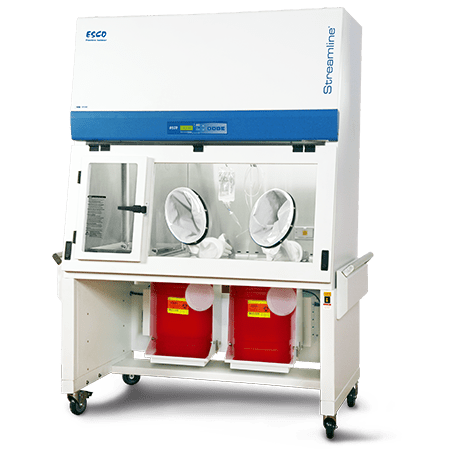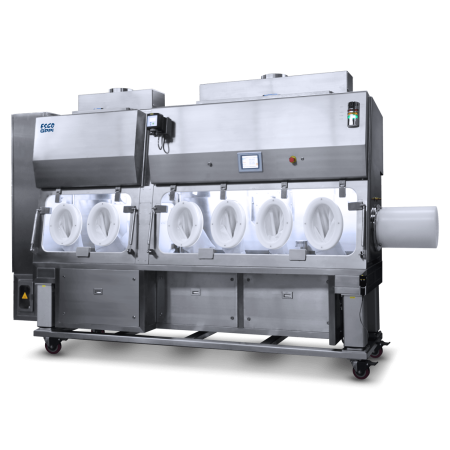RABS vs Isolators: Choosing the Right Barrier System for Safe and Effective Product Handling
Personnel are a significant source of contamination in aseptic manufacturing, and reducing human intervention in critical zones is essential to ensure the sterility of finished goods. Isolators and RABS (Restricted Access Barrier Systems) work to control contamination during pharmaceutical production. Because these systems are equipped with a variety of sophisticated protections and physical barriers, they protect the operator from harmful chemicals and safeguard the product from pathogens and other particulate contamination.
RABS (Restricted Access Barrier Systems)
RABS include safety-locked doors, a rigid machine enclosure, and glove ports that allow users to place their hands inside the chamber and adjust the product without interrupting the conditions inside the workspace. While a closed RABS system is suitable for use with slightly toxic products, it lacks the leak-tight certification required for highly toxic product assembly.
Advantages and Disadvantages of a Closed RABS System
Advantages:
- Easy to install
- Easy to validate
- Possibility to downgrade the production area to class B
- Humidity and temperature inside the Closed-RABS can be controlled with the adoption of a dedicated HVAC
- Possibility to recycle the air used inside system, saving HVAC energy consumption

Disadvantages:
- Surrounding production area must be class B (with an Isolator it can be downgraded to the less expensive class C)
- Limited protection for the operator, not useful with highly toxic products
- No option to perform “Wash in Place” cycles
- No option to perform automatic decontamination cycles (for example with, vaporised hydrogen peroxide)
Isolators
While there are different types of isolators used for various applications within the pharmaceutical space, one common type is a containment isolator. This isolator focuses on protecting the operator and environment from hazardous materials, usually operating under negative pressure.
Another isolator commonly used in the aseptic manufacturing environment is an aseptic processing or sterile filling isolator. These devices focus on protecting the product from contamination, usually operating under positive pressure to maintain a sterile environment, making them indispensable tools for pharmaceutical manufacturers working with particularly high-risk products.
Both types of isolators are critical in their respective applications, ensuring safety and compliance with regulatory standards.
Advantages and Disadvantages of an Isolator System

Advantages:
- Maximum product protection
- Possibility to downgrade the production area to class C
- Humidity and temperature inside the Isolator can be controlled with the adoption of a dedicated HVAC
- Possibility to recycle the air used inside system, saving HVAC energy consumption
- Full operator protection, useful with highly toxic products
Disadvantages:
- It cannot be installed on existing machines, no upgrades possible
- Higher cost to purchase
- Possibility to perform “Wash in Place” cycles
- Option to perform automatic decontamination cycles (for example with Vaporised Hydrogen Peroxide)
- Enhanced automation
- Reduction in expenses (due to the downgrade of the surrounding production area from class B to C)
Both RABS and isolator systems are well established in the pharmaceutical industry and are methods of aseptic processing that ensure an improved processing environment for cleanroom operations.
Need a solution for viable air sampling within your closed system?
TRIO.BAS™ RABS and Isolator Units come with flexible and easy-to-sterilize components that can be installed within your closed system in your facility.
TRIO.BAS™ RABS ISOLATOR Kit, 100 Liters per minute, Contact Plate, with 1 Satellite with Induction Base
TRIO.BAS™ MULTIFLEX 1+2 Kit, 200 Liters per minute, Contact Plate, with Charging Cable
TRIO.BAS™ Remote Stainless Steel Aspirating System
TRIO.BAS™ SATELLITE Kit, Contact Plate
Meet the author

PHARMACEUTICAL PRODUCT MANAGER at HARDY DIAGNOSTICS
Joelle Brackeen, B.S. Marketing
Joelle Brackeen is the Pharmaceutical Product Manager at Hardy Diagnostics and has over a decade of experience in Marketing and Product Management. Before transitioning to the pharma sector, Joelle had the privilege of co-founding and helping to grow a business into a highly profitable, multinational enterprise. Her unique blend of entrepreneurial spirit and product management expertise contributes to her innovative approach and ability to drive successful products and strategic initiatives in the pharmaceutical industry. In her free time, she enjoys playing the piano and spending time at the beach.











